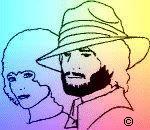This 2002 interview may be the most in-depth one we've ever had.
Sadly, the interviewer, Mark Harris, passed away a couple of years ago.
We will always be grateful for the interest, effort,
and skill he brought to the occasion.
Thanks, Mark.
Jack Blanchard & Misty Morgan
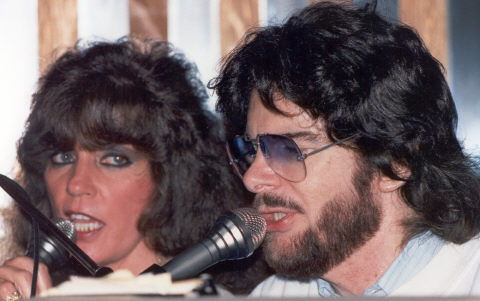
It all started in a
Buffalo hospital in the 40's when John and Mary (Blanchard) gave birth to
son Jack. The second component came a couple of years later in the same
hospital, when a different John and Mary (Donahue) gave birth to their
daughter Mary.
As children, both
probably looked a lot alike - both had brown hair and blue eyes and both
trace their ancestry to the Alsace-Lorraine area of Europe (between France
and Germany). Jack's heritage was all European. Mary had a little bit of
Native American in her genes - and along the way, she became
Misty.
Both were in unhappy
marriages and had, for awhile, lived in Southern Ohio. Despite nearly
identical beginnings, Jack and Misty never met each other until they were
both playing piano in adjacent clubs a thousand miles from Buffalo in the
60's in Hollywood - Florida, that is.
By that time, Jack
had been in the music business for almost ten years. The doo-wop vocal
quartet he belonged to in his youth - the Dawn Breakers - had even once
recorded for the Decca Records subsidiary that had also released many
Buddy Holly hits (Coral Records). Later, Blanchard headed other groups,
namely Jackie Blanchard & The Rockin' Impalas and The Jack Blanchard
Group.
Misty Morgan was,
during the 60's, a pioneering woman in the music industry, producing her
own records (she was the first woman to produce a #1 country song) and
incorporating the "electronic" sound into her keyboard arrangements -
something everyone in the business seemed to be doing some twenty years
later. Her onstage show at the time consisted of more jazz-oriented stuff,
like Louis Prima and Keely Smith did in the 50's.
You'll recognize her
as Jacqueline Hyde and Maryanne Mail, both pseudonyms she used in the
60's. Or maybe you won't. :-)
The fact is, no
matter how good the Rockin' Impalas or Maryanne Mail were, no one outside
of local fans knew of them until after the principals teamed together in
1967 as Jack Blanchard & Misty Morgan. In 1969, they achieved a
minor hit with Big
Black Bird (Spirit Of Our Love), which reached #59 on Billboard's
Hot Country Singles chart. An earlier single, Bethlehem
Steel had failed to chart.
But they had cracked
the charts, and #59 wasn't that bad of a start. So they released their
next single, Changin'
Times. More exquisite harmony, like Big Black Bird, and a
song with a message. But the charts and radio ignored it. Just when it
looked like Jack & Misty might've become a one-barely-hit wonder act,
they decided to release an absolutely silly song Jack had written called
Tennessee
Birdwalk. The song topped out at #1 on the country charts and #23
on the pop charts.
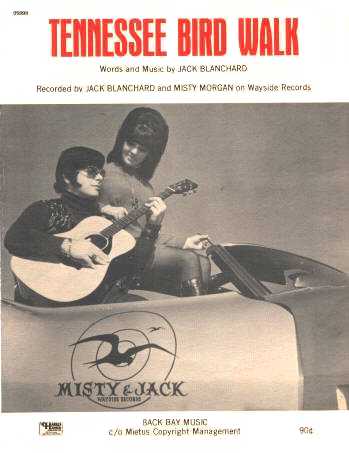
Everyone seemed to
be "chirp chirp"ing along with Jack & Misty that summer. By the
way, the wah-wah guitar used to effect the sounds of the birds walking
southward in dirty underwear was the first usage of such an instrument in
a country hit. Not only were Jack & Misty on top of the charts, but
they were trailblazing as they did it.
Tennessee
Birdwalk earned the duo a Grammy nomination and played on radio
stations throughout that summer, eventually staying on the charts for 19
weeks. While that's a mid-range chart ride these days, in 1970, it was
quite an extended stay.
The next single
would be even more critical than Birdwalk...it would help determine
whether Jack & Misty's career would be a flash in the pan or a real
thing. Sticking with the novelty tune concept, they decided to release Humphrey
The Camel in June. Personally, this writer thinks this song was
even funnier than the big one earlier in the year. It went to #5 on the
country charts. How DOES Jack make the "authentic camel love call" without
tearing his vocal chords to shreds, anyway?
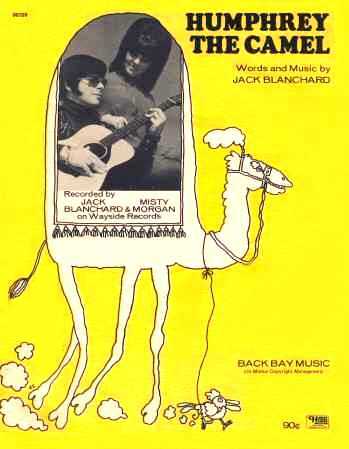
In explanation of
his uncanny ability to write novelty songs that remain funny and un-dated
after many years (a talent shared with few others, Ray Stevens & Roger
Miller most notably), Jack says, "Silliness runs in my family. We all used
to sit on our front porch and make smart aleck cracks about the people
passing by. We were always trying to top each other, and I didn't always
win".
"I worked for awhile
as a stand-up comic", Blanchard continues. "I can't resist a funny ad lib.
Misty's pretty funny, too. People look for meanings in our funny songs.
They often tell us meanings we didn't even know were there."
The next hit was a
change of pace. No deep meanings, no funny concepts, just your standard
cover of a pop song, which was often done (and still is) by country
singers of the era. But for a change, the cover ended up sounding better
than the original. In 1965, the Fortunes had taken You've
Got Your Troubles (I've Got Mine) to #7 on the pop charts. In
1970, Jack and Misty hit the Top 30 country charts with their own
version.
At this point, their
career was dealt a low blow when the label that had released their big
hits of the past year went bankrupt. An album had been released about the
same time as Humphrey The Camel, titled Birds Of A
Feather. It hit #16 on the country album charts (#185 Pop), yet
Jack & Misty never saw a penny from royalties on either the album or
the singles.
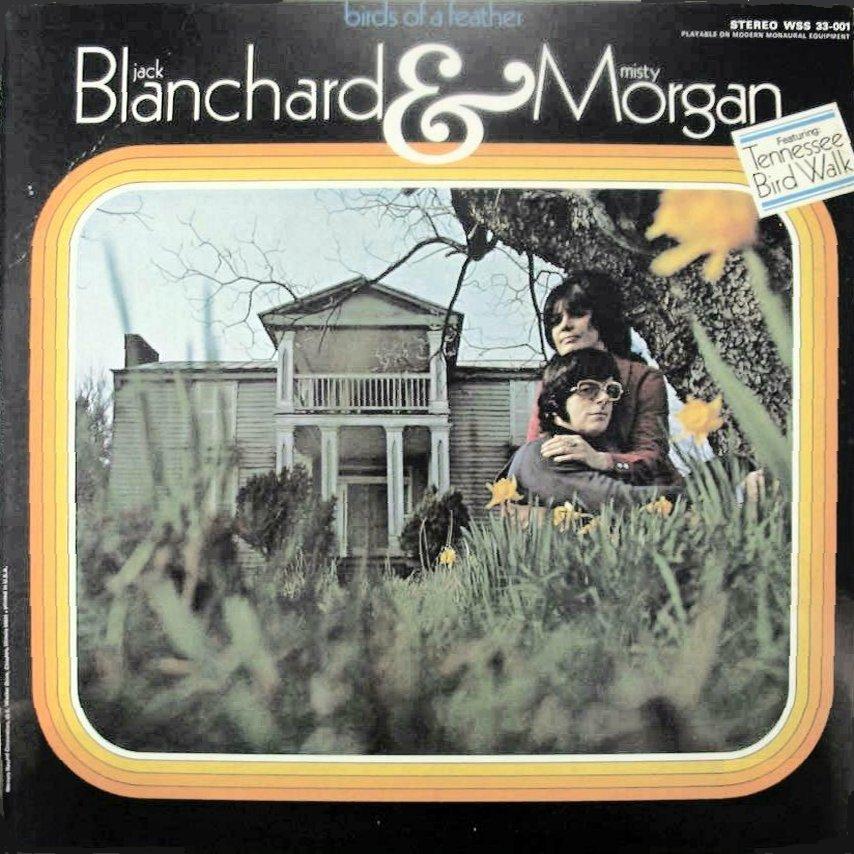

Eventually they took
matters into their own hands and, pre-dating independent record
distribution methods like Napster and MP3.com, they took the recordings
from the Birds Of A Feather album and had a private pressing
made and sold them at their concerts and appearances, finally realizing
some reward from their recordings, however small.
It's important to
realize how revolutionary it was at the time for them to take control over
their own recordings. Traditionally (and as they would still have you
believe), record companies claim all ownership of everything they ever
release. It doesn't matter that the artist pays for the session time in
the studio, the recording process, the session players, the promotion, and
(as Jack likes to say) even pays for the label owner's sister's nose job.
More on this later.
After the Wayside
bankruptcy, Misty & Jack signed with a new up-and-coming label, Mega
Records. They were on the label's roster with other rising stars such as
Sammi Smith, Brian Collins, Patsy Sledd, Henson Cargill, and Ray Pillow.
Mega seemed to allow an artist a little more breathing room to step
outside the boundaries then established by the big labels; one good
example was Sammi Smith's Help Me Make It Through The Night. Never
before had a female vocalist been allowed to record and release a song so
frankly and overtly sexual. You may remember the song ended up being
1971's CMA Song Of The Year, hitting #1 on the country charts and #8 on
the pop charts.
It was during their
term at Mega Records that Jack was given his nickname "the Velvet Saw".
One of the Mega promotion men, Tom McConnell, came up with it as an apt
description for Jack's voice. Jack adds, "and all this time I thought I
was Bing Crosby!" These days, the nickname serves as the name for the
duo's own record label - Velvet Saw Records.
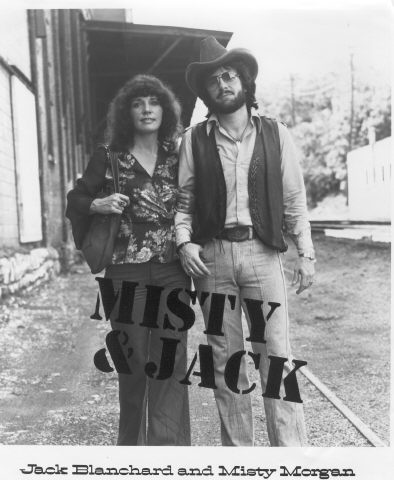
Jack and Misty were
ready to start recording again. The environment in which they would be
working this time really seemed conducive to their own outside-the-box
sensibilities. The first song for Mega re-visited Jack's ability to write
songs with meaning and feeling, as There
Must Be More To Life (Than Growing Old) hit the charts as a
two-sided hit. The other side followed in the vein of their two big hits
on Wayside, showing the duo's sillier side. Titled Fire
Hydrant #79, the song was an ode to a fire hydrant "all stumpy and
red / we love you tho' you got no hair on your head".
The two-sided record
did well considering the label had a small promotion staff and no national
distribution contract with a bigger label, as Wayside Records had had with
Smash/Mercury Records. The public definitely preferred the more serious
side this time, and now some thirty years later, most listeners seem to
appreciate the duo more for their serious songs than the silly ones that
did much better chartwise.
In fact, in 2001,
There Must Be More To Life (Than Growing Old) was again released
(the original Mega recording) as a single and helped propel the duet to
being the #4 independent recording artists in the world.
No wonder - the song
remains a timeless paean to melancholy, hopelessness, and despair. That
feel is reflected not only in the words, but the sound. No wah-wah guitars
here. In reflection, Jack Blanchard says this about the song: "It reflects
a hopeless time in our lives, before we'd even met. I worked in the dirty
factories and waded through the brown slush. We were each in a previous
marriage that was not happy. When writing that song, I put myself back in
that time, and the title was just the way I felt."
In early 2002,
another re-release of a "serious" song recorded in the early Mega days did
well for the duo. Somewhere
In Virginia In The Rain hit the Top 5 on the indie charts,
climbing about ten positions further than the original single did in 1971.
Another song from their Mega album, Rings Of
Gold, went to #1 on the indie records charts in 2002.
When asked if it was
ever determined just where the singer had been in Virginia, Jack answers,
"We both love the state of Virginia. I think it was probably somewhere
near Roanoke". I asked if the song was written from personal experience,
and Jack goes on to explain, "It comes from places I've been in. Not
exactly, but there are elements of my experiences in it. Misty does a big
part of the arrangements after I write the songs, and we both like that
sort of 'traveling music' feeling."
Lest you think that
lovely Misty Morgan sits back and lets her outgoing wordsmith husband talk
for the duo, you'd be mostly right <grin>! She's the more quiet,
contemplative half of the duo, but doesn't hesitate putting in her
feelings when asked to do so. When asked why she never played on her
exquisite beauty to help their music career like so many female singers do
today....
"I believe that
music is an art and should be carried on its own merit. Nobody cares how
Rembrandt or Picasso looked. Their art speaks for itself." Misty
continues, "I really don't like the way they are selling sex instead of
the music today. It suggests something may be lacking in the
music."
Misty also takes the
mic when it comes to explaining the duo's longevity - a 35 year
working-together marriage that has outlasted all the other Nashville duet
marriage/partnerships except for Kitty Wells and Johnny Wright. Misty
explains, "We are opposites in many ways. I am intuition, Jack is logic.
We mesh like two gears, or jigsaw puzzle pieces. We feel that each has
what the other lacks. We never run out of conversation and ideas...we have
fun together. And one more thing: Love".
When asked if they
will still be pickin' and singin' together into their 80's just like Kitty
and Johnny still are, they simultaneously answer with a resounding YES.
"We will probably be found dead onstage in front of a mic at the age of
101."
Actually, touring is
not high on their list of things to do anymore. "We don't do as many shows
as we'd like. We really enjoy doing our live shows. We've done a show in
Nashville, a few in Florida lately. We're waiting to hear from an agent in
Pennsylvania. Call us if you need us <smile>".
Perhaps one of the
reasons they don't tour as much as they used to is that Jack has a side
business these days, restoring old vinyl from his and Misty's recordings,
as well as for a slew of other artists.
"I use a turntable,
cassette deck, computer and CD burner for hardware, along with a number of
complex software programs such as CoolEdit Pro, Pristine Sounds, Sound
Forge, Sonic Foundry, Cubase, Steinberg, and a bunch of exotic plug-ins,"
says Blanchard. "I also wash the records with dish detergent and blow them
dry before I start. Sometimes I have to splice together good parts from
more than one copy of a record to make a good whole one."
Besides Jack and
Misty records, he's working on old recordings by artists like Mayf Nutter,
Dick Shuey, Erin Hay, Marvin Rainwater, Pat Garrett, Ernie Ashworth, Hal
Willis, Hermann Lammers Meyer, Shirley Frederickson, Kenny Roberts, Marty
Martel, Vernon Oxford, and one little-known artist who many are just now
discovering and enjoying, Jackie Burns. Jack's restoration work on her
records should be released on CD before the end of the year.
(Burns' low-range
chart hits from the early 70's included songs like (If
Loving You Is Wrong) I Don't Want To Be Right, which is in current
rotation on our Internet radio station iCCC, and One
Big Unhappy Family. It's good to see that she's now being
re-discovered.)
In addition to
restoration work, Jack also does non-restorative, digital mixing and
mastering for record labels. For any such work, contact him here. (There's your
commericial, Jack!)
Meanwhile, back on
the ranch of the Legendary
Chicken Fairy, Jack and Misty were continuing to record their
special kind of music at Mega, having a hit about that big canary that
made "all your dreams come true". The novelty tunes were fewer and fewer
as the years went by (notable exception, Washin'
Harry Down The Sink...they didn't care what people'd
think).
The contemplative
side of Jack's writing skills was still putting them on the charts with
songs like Second
Tuesday In December and A
Handful of Dimes. The train was still riding smoothly on its rails
when - BLAM - Mega Records also went bankrupt and they were once
again without a label....but not for long.
Instead of signing
with another small independent label, they took the bait held out to them
by überlabel Epic Records, home of Tammy Wynette, George Jones, Joe
Stampley, Charlie Rich and others, and part of the Columbia Records (Ray
Price, Johnny Cash, Lynn Anderson) family. Singles continued to chart
during the Epic years, (Just
One More Song, Something
On Your Mind, Down To
The End Of The Wine, Because
We Love, I'm High
On You) but soon, it became apparent how a major label could cause
as many (but different) problems for an act as a small, tenuously financed
indie like Wayside and Mega could.
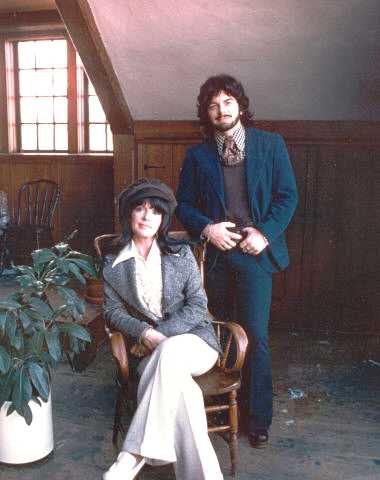
Management at these
major labels changes rather rapidly, and soon the label was being run by
new staff members, and the "not invented here" syndrome took over. Jack
and Misty were soon forgotten about. "We did have an Epic album...they
sent us the acetate advance copy, but it never came out," explains Jack
and Misty. "Those major labels don't even know they have those masters -
if they haven't erased them to make tape space."
After a jump to
another major (but smaller) label - United Artists - yielded no hit
singles, it was back to a string of small indie labels, then the public
just stopped hearing about the duo altogether about 1980.
What happened? Jack
explains, "Misty was very ill in the late 70's due to bad results from a
minor operation. We had to drop out for a couple of years. When we tried
to get back into the Nashville scene, we found that we'd lost our place in
line.
During the 80's, we
played a jazz circuit in clubs and casinos in New York state, Atlantic
City, and Miami. The new suits in country music didn't remember us and
didn't care. Fortunately, Misty is multi-talented. She plays great jazz
piano. I play bass and we had a drummer. We worked with jazz artists such
as Earl "Fatha" Hines, Marian MacPartland, Barney Kessel, Tal Farlow and
others. We also had a non-country CD out titled Masters Of The
Keyboard."
Now, all of Jack and
Misty's old and new recordings are available on their own Velvet Saw
Records. E-mail them for more
information, or visit this page on their
web site.
As noted earlier,
Jack and Misty are in the thick of the current fight over use of new
technologies in the music industry and artist control over their
recordings. They speak freely about their part in the fight, "We liked
Napster. It got a lot of music out to our fans, which is the most
important thing to us. Even though we were the #4 indie recording artists
worldwide in 2001, we didn't make any money from it. That's OK. We just
want the world to know our music."
Jack expands on
that, "I hope all good artists who have had their life's work stifled by
major labels will start pirating their own music. If they (the major
labels) sue us, what will they get? We're not getting rich at it, but life
is short and good music MUST be heard at all costs."
When asked about the
travesty known as CARP (the Copyright Arbitration Royalty Panel) whose
recommendations are being discussed and may soon be voted into law (the
act that makes independent internet radio stations such as ours pay DOUBLE
the royalty rate that established radio stations pay for use of the same
recordings on the airwaves), Misty explains, "We think it's terrible.
(CARP) framers and supporters should be ashamed - and stopped. Boycott
their music."
"A lot of our
current airplay is on Internet stations. We want it to stay that way.
Rather than being the death of non-mainstream music, CARP and the related
DMCA (Digital Millenium Copyright Act) may cause a boom in pirating, which
would be great. We have a friend who operates a well-known pirate radio
station in Ireland. His station has been popular for years. They can't
arrest us all!"
When asked if
there's anything they would like to tell their fans, the couple at first
answers, "not much", but then go on to say "we never make a record
thinking about what is commercial. We make music for people who like Jack
Blanchard & Misty Morgan music. Some of our music is traditional, some
is not. We use all the chords and instruments we feel a song needs. We'd
rather be controversial than ignored. We do country music by choice, not
by limitation. It suits our voices and lyrics."
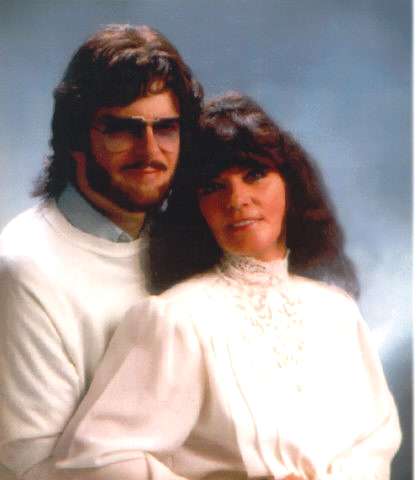
Ever the gallant and
loving husband, Jack also wants everyone to know that Misty has co-written
several of their songs.
Lastly he quotes his
old friend Roger Miller by saying, "I don't like to put a fence around
music". When I noted that he was the second artist that CCC has featured
who mentioned Roger Miller in an interview, Jack sent an essay he wrote
just after Miller's passing in 1992. I'd like to reproduce it here with
Jack's permission. He titled it A Stupid Human
Trick:
When I was trying to figure how this voice of mine, and the way I
write songs would fit into the music business, Roger Miller was a great
help to me.
His voice and style of writing were in the same category as mine:
None.
My first few country songs had a strong Miller influence. Most
people didn't hear it, but I did. I was and am a Roger Miller fan. I
don't know why, but "Engine #9" is my favorite. It doesn't have the
depth of "Husbands and Wives", but it is a minimalist gem. Simple is
good.
Every word, every phrase in his songs adds something to the
whole. No fill ins. That's what I've always tried for in my work. Any
word that doesn't add something, erase it. I learned a lot from
him.
Misty and I were doing a session at Columbia Studio B. Roger's
session in studio A was already going on. We took a few minutes and
watched through the window in the door. I remember hearing him say over
the microphone, "Let's go, folks. We're losin' light".
Right in the middle of our session Roger walked in, carrying a
brief case, and stood by the door, listening. I stopped everything and
told Misty I had to go meet Roger Miller and tell him what a fan I
was.
Just as I approached him with my hand out, he said, "Hi, Jack.
I'm a fan of yours." One of the best moments of my life.
The last time I saw him was at a party he hosted at the King of
the Road Motel. He wove through the crowd to greet us, and we got
talking. He must have heard one of our interviews, because he asked me
what I meant when I said that he was responsible for me getting into
country music. Here's where the stupid human trick comes in. I will
never know why, but I said this:
"I was just trying to get your attention."
He looked at me funny and drifted off into the crowd.
I could have told him all that I've told you here, but I
didn't.
And now I never can.
Jack Blanchard and
Misty Morgan have now been married, both in life and in music, for 35
years. They've been through and still have hard times, recently losing a
beloved family member. Yet, through all of it, they strike me as two of
the happiest, most satisfied people in the industry. Yes, I'm sure love
has lots to do with it, as Misty says, but I think it's also their ability
to look at life from many different angles, their ability to use words to
convey all those angles to us, their fans, and the knowledge that they've
done their best to add something to all of our lives, making it a little
easier to digest.
Their current
re-release of There
Must Be More To Life hits #19 on the IndieWorld charts. They are
also at position #12 on the Top Trax Traditional Country Music chart with
their newest single, It
Seems Like There Ain't No Goin' Home, on Stardust Records.
Stardust has plans to re-release Fire
Hydrant #79 this month. Their career continues.
Let's hope they keep
singing "Just one more song.....together".
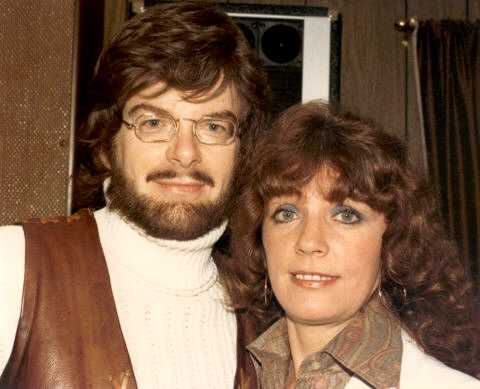
Make sure you visit
Jack & Misty's website.
For more insight
into what makes Jack Blanchard the man he is, take some time to read some
of the essays he's written over the past thirty-some years.
Since she's one of his favorite subjects, you'll learn a lot more about
Misty during your read, too!
Mark Harris, 2002
